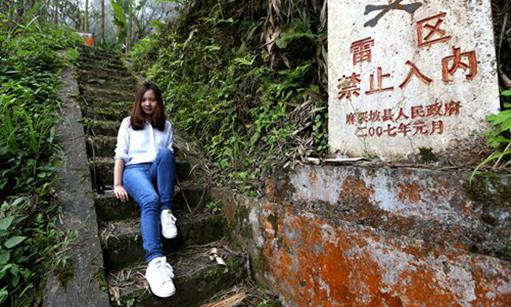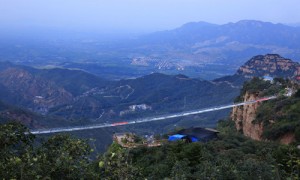导读:大家还记得在《太阳的后裔》中主人公经过雷区时的如履薄冰吗,就在中越边境上,有人正在经历着如此胆战心惊的生活。

I began to feel the longstanding influence of war the minute I stepped into Balihe village, which borders Vietnam in Southwest China’s Yunnan Province.
当我步入位于中国西南云南省与越南接壤的八里河村时,我开始感到战争的长期影响。
It is known as a "mine village," as in the region there are large - though no one knows how large - numbers of unexplored mines buried all around, remnants left over from the Sino-Vietnamese War nearly four decades ago.
这座村庄被称作“地雷村”,尽管没人知道地雷的数量有多大,但是该区域到处埋有大量未被引爆的地雷,这是近四十年以前的中越战争的遗留物。
We arrived at the village in May to report on the lives of villagers, the struggles they face living in such a dangerous environment and the efforts made by them and the People’s Liberation Army (PLA) to remove these deadly weapons.
我们五月份时来到这个村庄,报告村民的生活,他们生活在如此危险的环境中的挣扎,以及他们所做出的努力,人民解放军移除了这些致命的武器。
Before we kicked off our journey, my colleague told me at the airport that he had just accidentally broken his favorite vase, which he worried was a "bad omen."
在我们开始行程以前,我的同事在机场告诉我,他刚刚意外摔碎了自己最喜欢的花瓶,他担心这是个“不好的预兆”。
My colleague, a strong photographer, served in the army for two years. He knows clearly the horrible impact an exploding mine can have on a human body.
我的同事是一个能力很强的摄影师,在军队服务了两年。他清楚地明白,一枚正在引爆的地雷可以对人体造成多么糟糕的影响。
I read some articles about the village and did preliminary research about the possible dangers we might encounter. Despite the psychological expectations I had, stepping onto the land meant something different.
我们阅读了一些关于村庄的文章,对于我们可能遇到的危险做了一些初步调查。尽管我已经做好了心理预期,但是踏入陆地却有些不同。
Signs with skulls on them stand everywhere in the village, warning passersby that the surrounding area is littered with landmines and should be avoided.
村中到处都是画有头骨的指示牌,用以警示行人,周围地区布满地雷,人们应该避开。
But for the sake of putting food on the table, it’s almost impossible for the locals to stay out of these places, as they have to pick tea leaves, grow vegetables and search for firewood in these forbidden lands.
但是为了让食物摆上餐桌,当地人几乎不可能避免涉足这些地区,因为他们要采茶,种植蔬菜并且在这些禁区寻找柴火。
I got to know Wang Kaixue in the village, a man with a primary school education who taught himself how to dismantle mines. Wang’s father was killed by a mine and he declared a personal war on mines as a child.
我在村庄认识了王凯学,这个小学文化的人自学了如何拆除地雷。王凯学的父亲被地雷炸死了,当王还是孩子时,就宣称和地雷展开个人之战。
He doesn’t own any professional equipment and believes his eyes and intuition are more accurate mine detectors than sophisticated equipment.
他没有任何专业设备,他相信自己的眼睛和直觉要比地雷探测器和复杂的设备更加精确。
Every day he goes to areas where thousands of mines are buried to collect them, because he said the land "is too fertile and abandoning it is a total waste."
每天,他去那些埋藏着数以万计地雷的地方收集地雷,因为他说这片土地“非常肥沃,放弃它是种浪费”。
His campaign, which is incredibly dangerous, isn’t supported by the local government. But he is dissatisfied with their simple and crude way of dealing with the problem: erecting warning signs.
他的活动难以置信地危险,并不被当地政府支持。但他对他们简单粗暴的处理方式不满:设立警示标语。
Wang is lucky as so far he hasn’t got into a serious accident. After visiting Wang, I got the opportunity to talk to a PLA officer who is in charge of a mine-sweeping team in the region, the third time the military has deployed troops to clear mines. The first two mine clearance missions by the military were conducted in 1990s.
王很幸运,迄今为止,他没有受到重伤。在拜访过王以后,我找到机会和负责该区域地雷清扫队的人民解放军军官谈话。20世纪90年代,军方执行了头两次清除任务。
The officer said that before they embarked on the mission, his leader told him he must guarantee safety of every soldier. But just several days after I returned to Beijing, I learned that a young soldier in a different team had died while mine-sweeping.
军官说,在他们着手任务以前,他的领导告诉他,他必须确保每个军人的安全。但是没有几天,我回了北京,我获悉另一组的一个年轻军人在进行地雷清扫时死了。
During my interview, I asked the soldiers whether they wanted to move to another assignment. To my surprise, most of them said they didn’t want to.
采访期间,我询问军人他们是否想进行下一次任务。出乎我的意料,绝大多数人说他们不想。
While I do admire such lofty goals, I can’t help but think why it’s always the ordinary people who pay the price for war?
尽管我确实欣赏如此崇高的目标,但是我不禁发问,为什么普通人总要为战争付出代价?







